National Health Insurance in Taiwan
National Health Insurance has entered its 25th year. National Health Insurance continues to receive international recognition. According to the 2019 evaluation of the CEOWORLD magazine for the healthcare index of 89 countries in the world, and the Numbeo 2020 Health Care Index evaluation, both Ranked first in the world. It’s an important system to combat COVID-19.
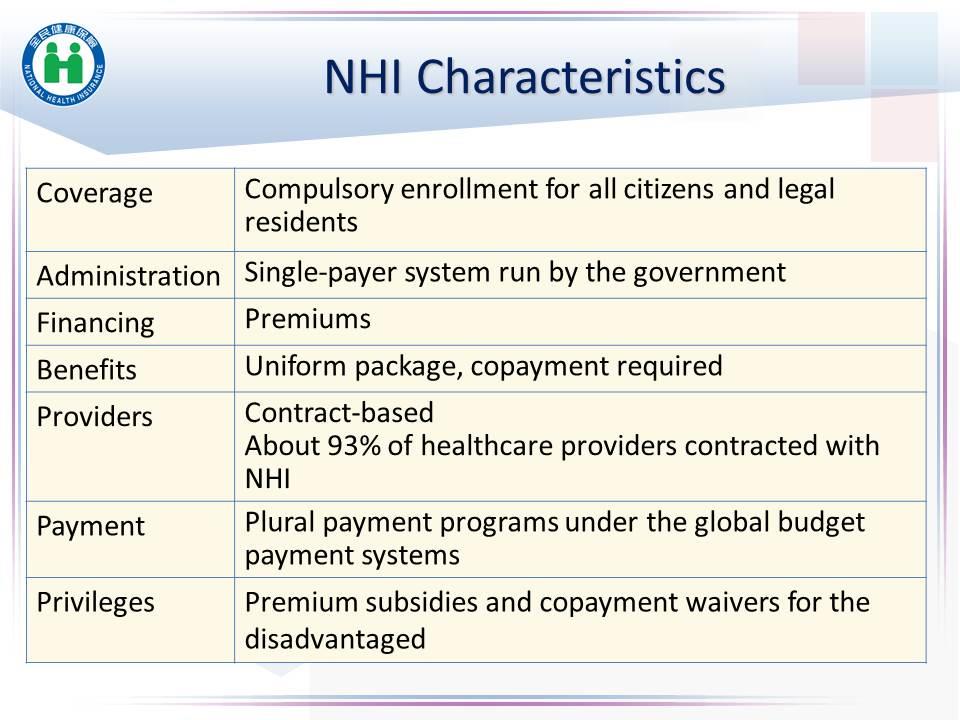
The features and role in combating COVID-19 are as follows:
(1) Single-payer System
The government launched National Health Insurance in 1995, combining medical benefits of various insurances to form a single insurer— National Health Insurance Administration (NHIA). The regular NHI premiums are calculated based on the insured’s monthly salary, and are shared by the insured, the employer, and the government. The insurance premium and copayment for the disadvantaged groups are subsidized or reduced by the government. Because of the single insurer system, the policies on combating COVID-19 of NHI can benefit the people and the medical profession of Taiwan.
(2) Comprehensive Medical Coverage
The coverage of universal health insurance covers all necessary medical care, including outpatient, inpatient, dental care, Chinese medicine and prescription drugs. Therefore, people suffering from COVID-19 do not need to worry about medical expenses. NHI provides comprehensive medical coverage for people, so they can feel free to seek medical treatment.
(3) Easy Access to Healthcare
NHI has contracted with about 93% of medical institutions nationwide (100% of hospitals, 92.6% of primary clinics, and 79.3% of pharmacies). People can go to medical institutions freely and pay only a fixed amount copayment at the time of medical service with the rest of medical cost covered by the NHI. In Taiwan, the average number of medical visits per person per year is about 15 times. Taiwan’s high-accessibility and low-copayment condition makes people habitually seek medical services when they are not feeling well. Thus, during the times of the epidemic, the medical profession can easily track or reach potential patients or patients with mild symptoms, which is very helpful in fighting against the pandemic.
(4) Digitalization of Medical Information
The hospital claims submission and payment reimbursement system are fully automated. The computer automatically examines the medical claims of medical institutions to increase efficiency, and also makes Taiwan's health insurance administrative cost reach the world's lowest (less than 1% of medical expenses). On the network system, a closed exclusive network, virtual private network (VPN), is used for data security. During the times of the COVID-19 pandemic, real-time sharing of medical information such as travel history and medical history is important to assist medical staff to discover and trace patients.
(5) IC-chipped NHI Card
The NHIA uses IC chip cards as insurance certificates, which can provide people with multiple smart functions. The health insurance card is an important link between the patient and the medical institution. The doctor can quickly obtain the patient's recent medical information, and can also be used to track the patient during epidemic outbreaks, such as the SARS in 2003 and the COVID-19 in 2020. The use of NHI IC card allows suspected cases to be tracked and detected in real time, which is helpful for epidemic prevention.
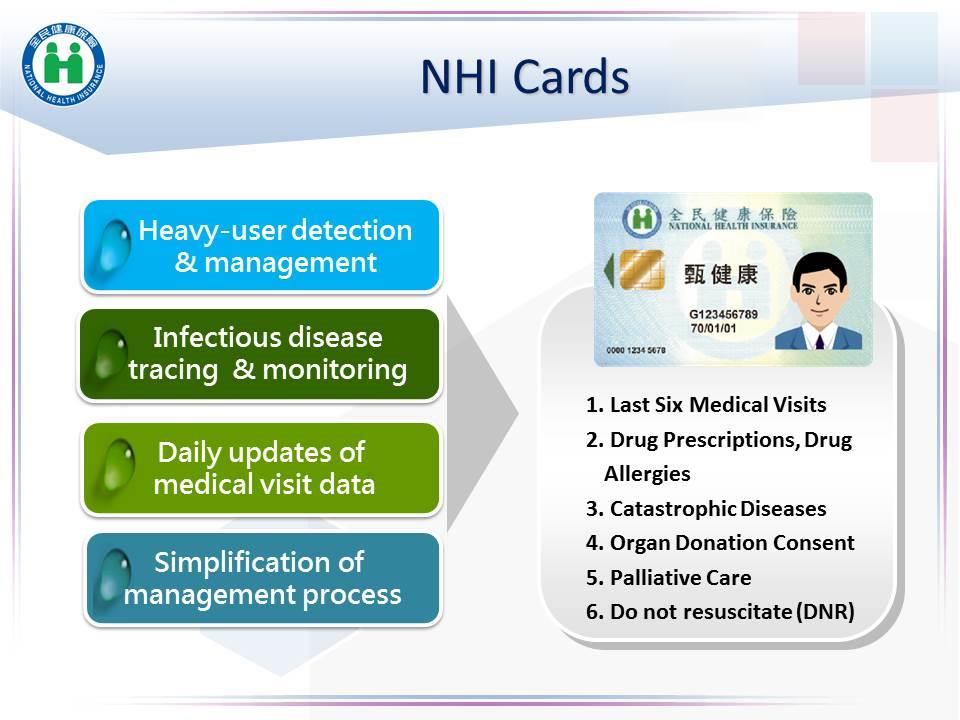
(6) Promoting Referral System
In order to improve the quality of medical care, we also promote a tiered medical system. In addition to strengthening the service capacity of primary-level medical institutions, and raising the hospital's payment for treating critical diseases, the NHIA also builds a vertical integrated strategic alliance between hospitals and clinics. Large-scale hospital takes the lead in vertically integrated strategic alliances with neighboring primary-level medical institutions, and establishes a cooperative channel for transferring patients upstream or downstream. People can get medical care through tiered medical system, which can avoid the cluster infections caused by the influx of patients into the hospital.
Promoting Digital Health
(1) NHI MediCloud System Assists in Fighting COVID-19
Through the "NHI MediCloud System", the medical information scattered in different hospitals and clinics across hospitals, counties and cities, regardless of holidays and day and night can be shared effectively. In 2013, the NHIA completed the patient-centered NHI PharmaCloud System. The NHIA upgraded the NHI PharmaCloud System to “NHI MediCloud System” in 2015 based on users’ feedback and clinical needs. NHI MediCloud system not only includes medication records but also includes other information like surgical records, examination records and results, dental care records, discharge summary, Chinese medicine records, rehabilitation records, allergic substance and care list for specific drugs. The NHIA also encouraged hospitals to upload 47 kinds of patients' medical images, including CT, MRI, ultrasound, gastroscopy, colonoscopy and X-Ray images since 2018.
In the early stage of the outbreak of COVID-19, in order to effectively avoid the flow of high-risk people and the risk of infection in medical institutions, the NHIA quickly planned the "NHI MediCloud System" as a platform to share the travel and contact history according to the instructions of the Executive Yuan and the Central Epidemic Command Center. Under the premise of personal data security, a new function of querying the travel history and contact history of patients is added to assist front-line medical personnel to judge infection risks and take relevant infection control measures.
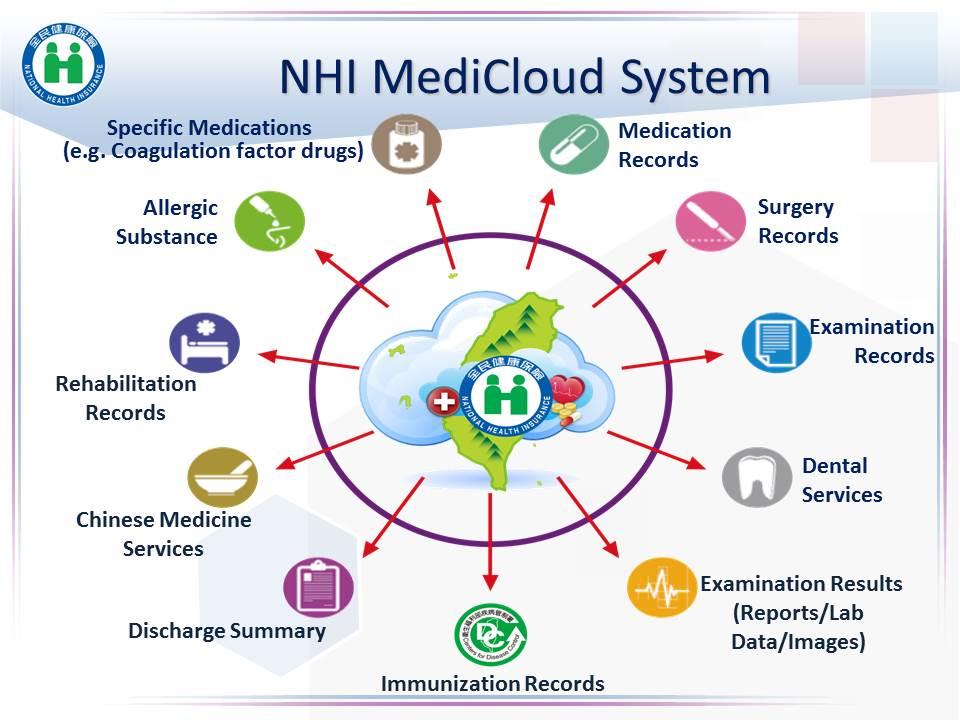
(2) My Health Bank
My Health Bank was launched in 2014 on the NHIA website. Citizens can simply use the Internet and their Citizen Digital Certificate or NHI Card which has been registered to apply for My Health Bank. After their identity is verified, they can immediately search for or download their healthcare information. Users can download the past three years of their medical records and health information, including 14 categories: inpatient and outpatient data, surgery, prescriptions, allergy data, liver cancer prognosis and end stage renal disease (ESRD) evaluations, test (examination) results, preventive healthcare information, organ donation/palliative and medical care directives, adult preventive healthcare, inoculation, and physiological measurements. This system serves as a major part of policies that aim to provide healthcare and medical data to the public, for better self-health management.
During the COVID-19 pandemic, people can log in to My Health Bank to pre-order name-based masks after they complete their identity certification or mobile phone certification.
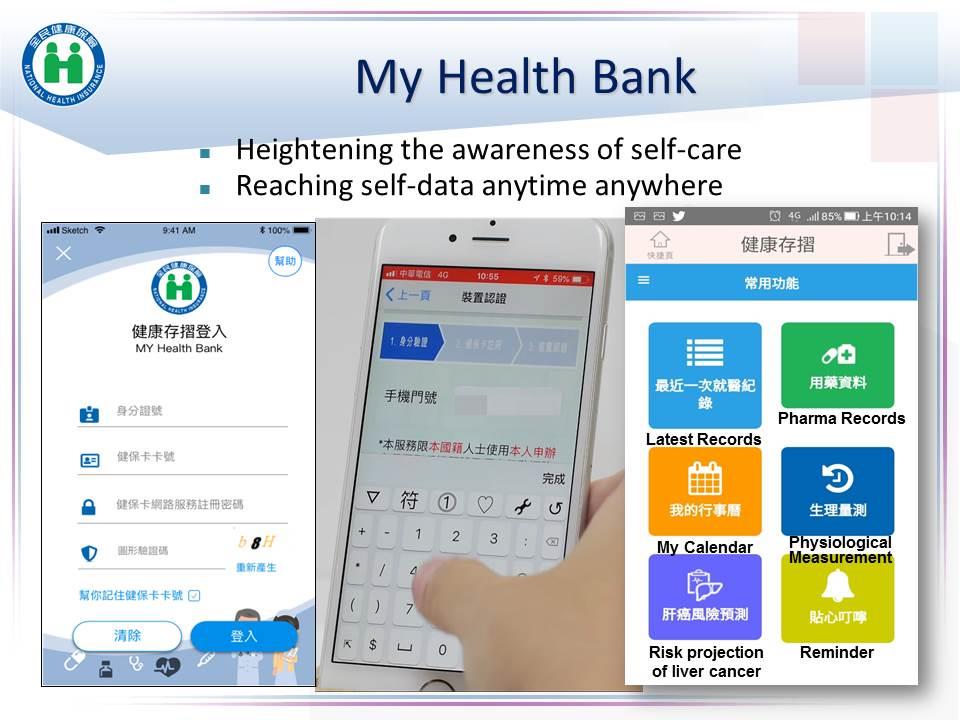
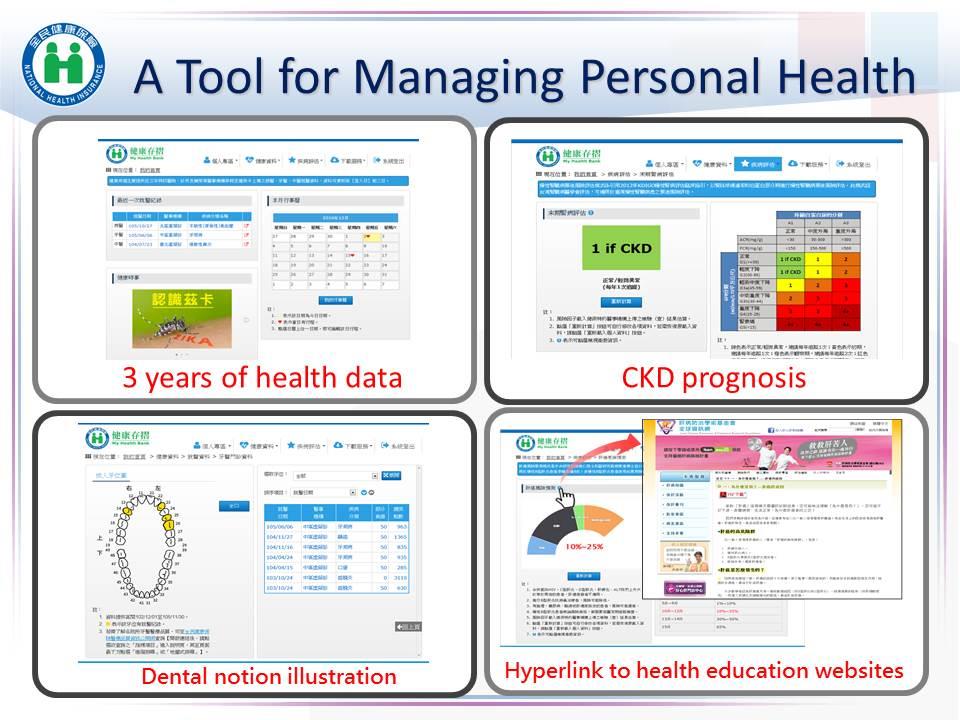
NHI Assists in Fighting COVID-19
To combat Covid-19, the Taiwanese government took effective measures to investigate the source of infectious cases and contain the spread of disease. The health insurance database and the MediCloud system built over the years have become one of the important tools to help contain the epidemic. Medical institutions can exchange needed information through MediCloud system and provide relevant information for generating outbreak report. All these containing measures are implemented based on the " Communicable Disease Control Act" and " Special Act for Prevention, Relief and Revitalization Measures for Severe Pneumonia with Novel Pathogens " and aim to minimize the infringement of personal privacy and maximize the benefit of public health security.
(1)Combating COVID-19 with National Health Insurance database
1.Assisting in epidemic investigation by providing medical information
The National Health Insurance Administration provides the CECC with a daily roster for home quarantine and home isolation, a daily analysis of patients with respiratory diseases and diarrhea and the medical data analysis of home quarantine and home isolation.
2.Diverting the suspected case to designated community laboratories
In order to establish a community screening network for COVID-19 and expand the capacity of medical services, the National Health Insurance Administration (NHIA) sets a new selection as a designated community laboratory on the NHI e-Referral System.With this mechanism, doctors in local clinics can rapidly help a suspected COVID-19 patient screened in community and stop suspected cases rushing to the emergency room of a hospital.This mechanism also lowers the possibilities of the spread of coronavirus in hospitals. The NHI MediCloud system will also indicate the referred case which is not screened.
3. Warning remarks in The NHI MediCloud to manage cases
The NHIA shall put travel remarks on people kept in home quarantine and contact remarks on people kept in home isolation in the NHI MediCloud. Meanwhile, aircraft crew members, medical professionals, residents and workers of the residential institutions for long-term care are all put remarks of profession in the NHI MediCloud. If these aforementioned people visit a doctor, the risk for contracting COVID-19 can be well evaluated.
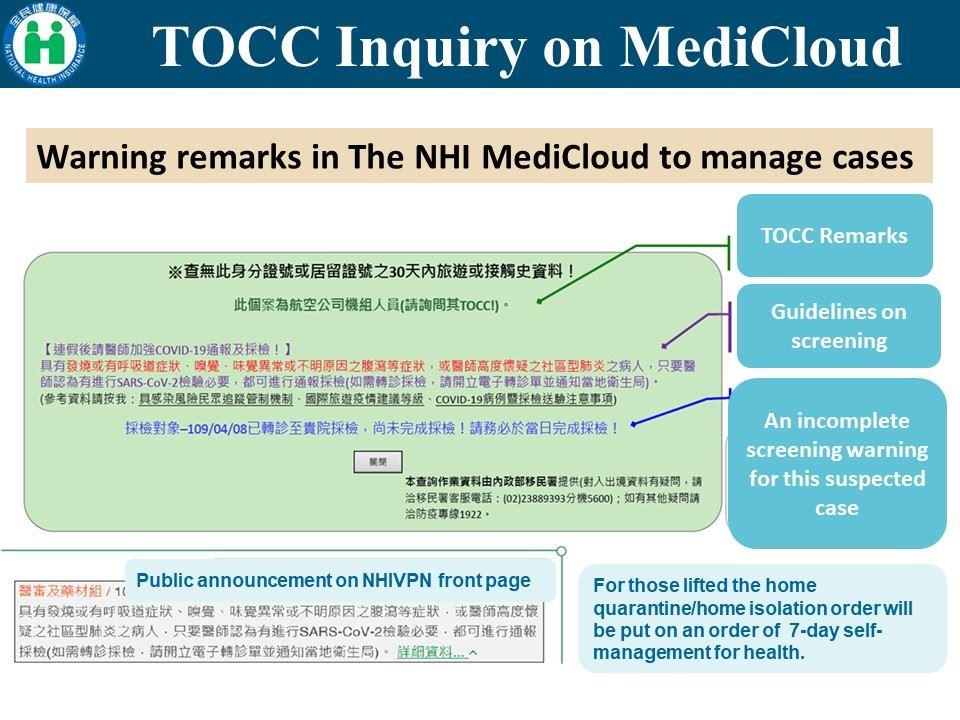
4.NHI reimbursing Telemedicine for people in home isolation and home quarantine
In response to the COVID-19 pandemic, people who have urgent medical needs other than a fever or respiratory symptoms during their home isolation and home quarantine, they can have a telemedicine arranged by the local health authority. Considering the privacy issue, doctor shall use a consultation room in a medical institution for a telemedicine. NHI covers this type of telemedicine during the COVID-19 pandemic.
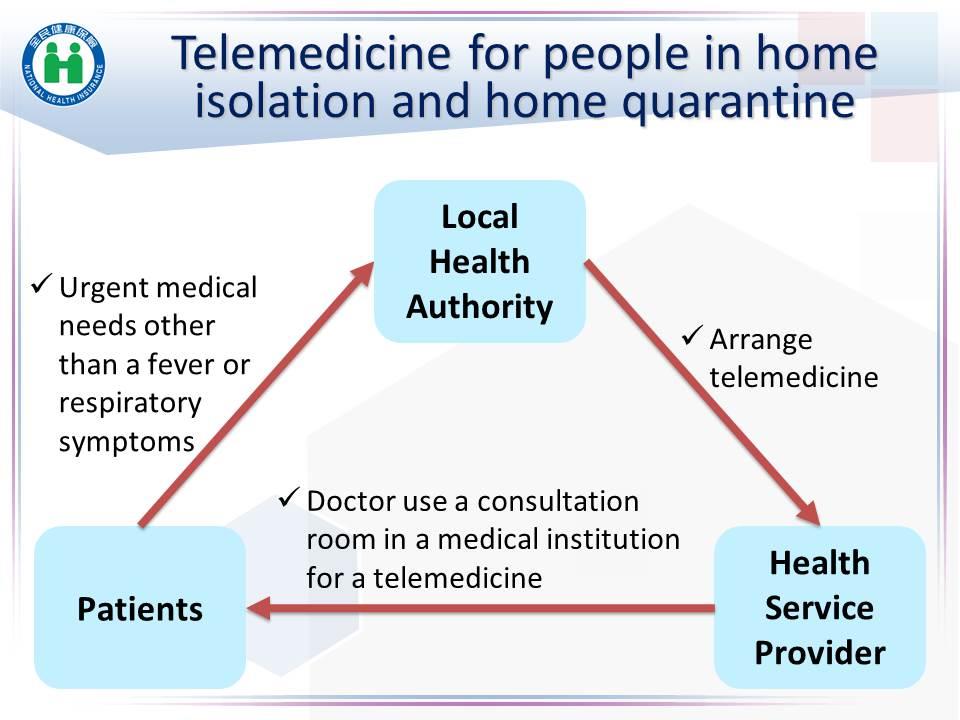
(2) Name-based Mask Distribution System
Name-based Mask Distribution System is based on the NHI card for everyone. Under the Name-based System for Mask Purchasing, people are required to use their NHI Card to purchase masks, and the date and the amount of masks will be recorded in the NHI MediCould System. People buy the masks at pharmacies named Name-based 1.0, the online purchase called Name-based 2.0 and recently making an order at the convenient store’s Kiosk called Name-based 3.0.
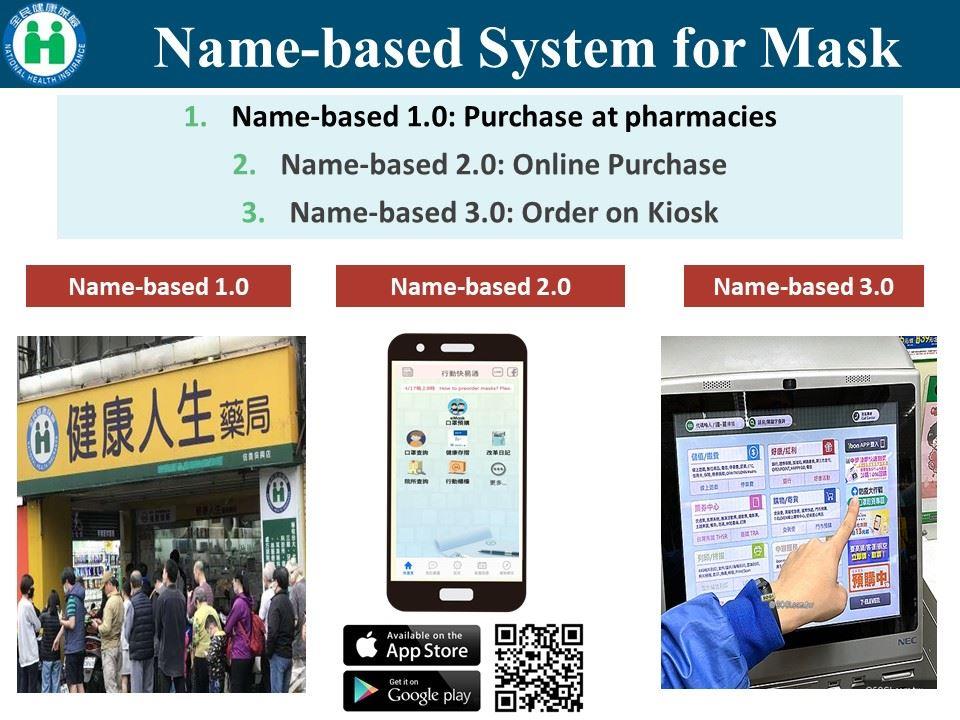
1.Name-based 1.0: Purchase at pharmacies
The mask containment system is built under the NHI MediCloud system and operated through the Virtual Private Network by the NHIA, and masks are sold through NHI-contracted pharmacies and public health centers. The mask containment system is used by the NHI-contracted Pharmacies for the sale management, where people’s qualifications to buy masks, the records of the amount and date of mask purchasing will be managed. The NHIA also releases the updates on the mask stocks of every single NHI-contracted pharmacy on the NHIA website. In collaboration with Taiwanese software engineers, Minister without portfolio Ms. Audrey Tang and her partners created information platforms for open collaboration to the general public, enterprises and industries. For the first real-time map of local mask supplies to the following over 100 various applications, Ms. Tang has set a paradigm for digital solutions to combat COVID-19.
2.Name-based 2.0: Online Purchase
In order to improve the queue issue for purchasing masks at pharmacies, and to increase accessibility to masks for people aged 20 to 40 who are usually regularly employed and full-time students and account for 40% of the aforementioned age group, people can go online to buy masks with NHI Health Express APP on a cellphone, or go to eMask purchase system with the NHI card/ Citizen Digital Card and a computer to buy masks anytime and anywhere.
3.Name-based 3.0: Kiosk
In order to provide people with a more convenient way to pre-order masks, people can make an order on Kiosk with their NHI Card at the convenient stores nationwide.

